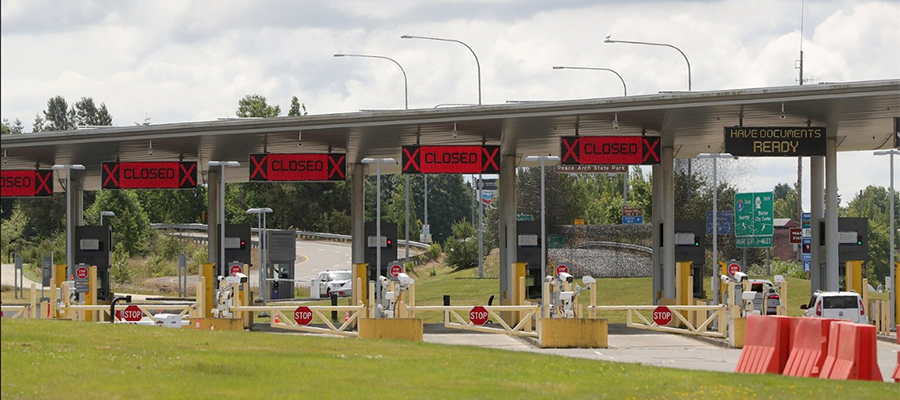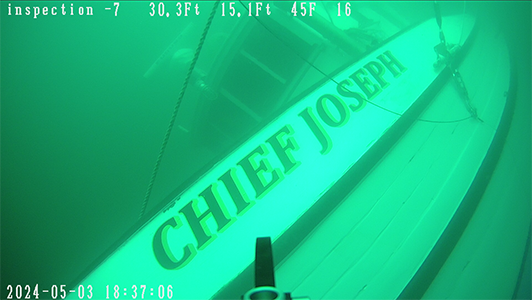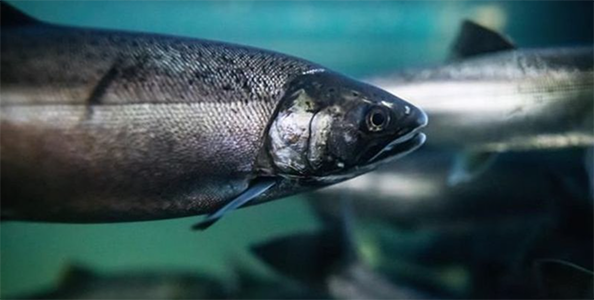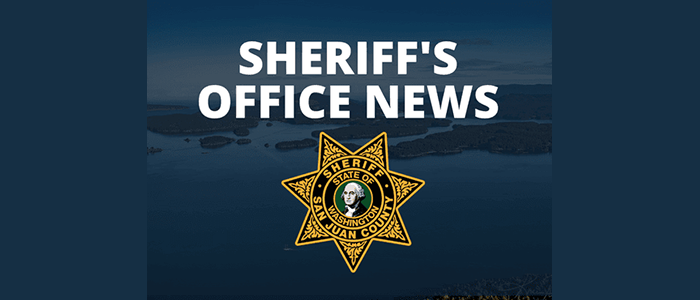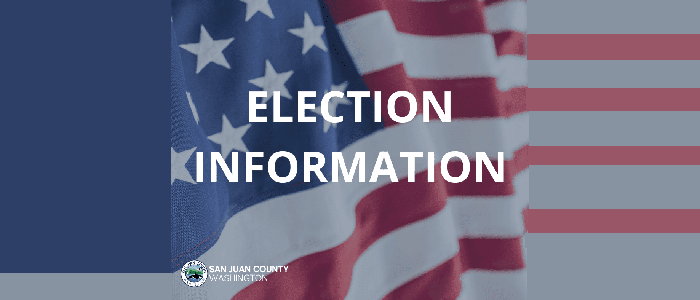||| FROM SEATTLE TIMES |||
BLAINE — At Border Mailbox and Parcel, just minutes from the U.S.-Canada border, owner Doug Hornsby all but trips over the economic fallout of the pandemic every time he comes to work.
Before COVID-19, Hornsby’s customers were primarily Canadians who used his Blaine address for their online purchases to take advantage of cheaper U.S. shipping.
But that bit of globalization ground to a halt in March 2020, when the pandemic shut the border to nonessential travelers — and turned Hornsby’s shop into a kind of package purgatory, with thousands of unretrieved purchases.
“I have stuff that’s been here 16 months,” the 71-year-old grouses as he steps around a 65-inch flat screen TV that showed up last spring and hasn’t moved since.
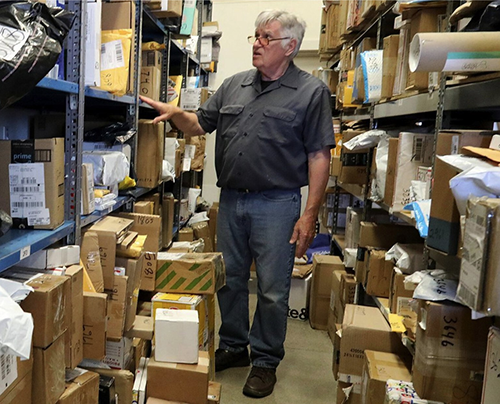
Douglas Hornsby, owner of Border Mailbox and Parcel in Blaine, is surrounded by packages addressed to Canadian residents who haven’t been able to cross the border to pick them up for more than a year. Before COVID, Hornsby’s customers were primarily Canadians who used his Blaine address for their online purchases to take advantage of cheaper U.S. shipping. (Greg Gilbert / The Seattle Times)
Nor is it clear when it will move. Canada recently announced it will start easing some border restrictions, on July 5. But other restrictions have been extended through July 21 and a full reopening won’t happen until 75% of Canadians are fully vaccinated, which is likely many months away.
Those delays mean more economic pain and uncertainty for Blaine’s 10 or so mailbox service firms, along with the many other Canadian-dependent businesses in this charming community of some 5,000 residents.
“We’re just losing money every month,” says Hornsby, who says he netted less than $800 in 2020. “It’s frustrating.”
Hornsby could be speaking for hundreds of Washington state businesses that used to profit on Canada’s appetite for American goods and services, but have been in limbo for more than a year.
In Seattle, where Canadians accounted for one of every 10 pre-pandemic visitors, border restrictions pose yet another roadblock to recovery of the city’s downtown and its tourism, performing arts and professional sports sectors.
But the pain may be most acute in communities closer to the border.
Before COVID, towns such as Blaine, Lynden, Sumas and Bellingham in Whatcom County, and Port Angeles in Clallam County, enjoyed a symbiotic relationship with the roughly 3 million consumers in greater Vancouver, Victoria and other Southern British Columbia communities.
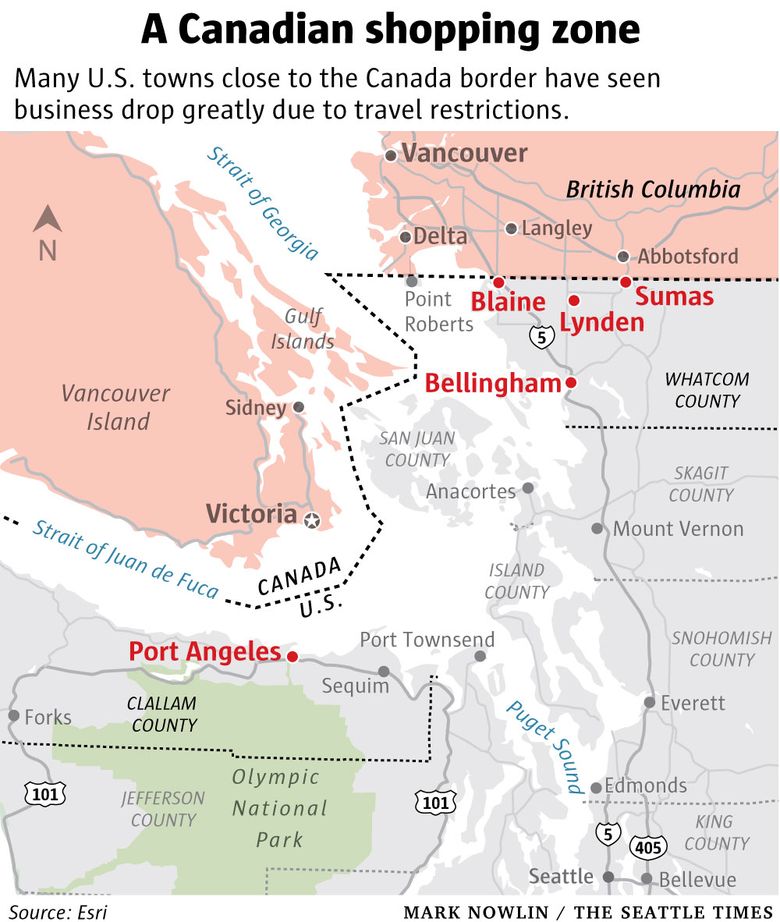
Many products are considerably cheaper in the U.S. than in Canada, thanks in part to differences in the countries’ tax regimes and business practices. Gasoline, for example, can be around $1.25 less per gallon than in Canada, while milk can be around $2 less for a gallon, depending on the exchange rate, merchants say.
Incoming Canadians can also find retailers, such as Trader Joe’s, that aren’t in Canada, and a larger variety of products, says Laurie Trautman, director of the Border Policy Research Institute, or BPRI, at Western Washington University.
Another big draw: Whereas fast-growing southern British Columbia is often heavily congested, “when you drive to Whatcom County, you’re not dealing with traffic,” Trautman says.
Those attractions turned much of northern Washington into a Canadian shopping zone.
At the Bellingham Trader Joe’s, 27% of the cars in the parking lot were from Canada, as were 39% at the local Costco and 45% at the local Ross Dress for Less, according to a BPRI license plate survey from September 2019.
And for smaller merchants in border towns, Canadians can account for an even larger share of business.
Before the pandemic, much of the gasoline and diesel sold in Blaine went to Canadians, merchants say. At the Chevron on Peace Portal Drive in Blaine, owners Michael and Skye Hill reckon that 90% of the 3,500 gallons of fuel they sold daily went into Canadian gas tanks.
Canadians also bought a lot of American milk. Before COVID, Lynden-based Edaleen Dairy, which has retail outlets in Blaine, Lynden and Sumas, made roughly 70% of its retail milk sales to Canadian visitors, says sales manager David Dodson. The Blaine Exxon alone sold more than 200 gallons of milk a day from its convenience store, mainly to Canadians, with individual buyers grabbing “five, 10, 20 gallons, even more, sometimes,” says manager Virendra Singh.
All told, in 2018, Canadians accounted for around $140 million of the pre-COVID retail business in Whatcom County, or 11.5% of the county’s taxable retail sales, according to a BPRI analysis.
But most of those Canadian dollars have vanished since the imposition of border restrictions, Trautman says.
And while those losses can be more readily absorbed by national chains such as Costco and Trader Joe’s, many smaller businesses have struggled. As total border crossings, north and south, have plummeted more than 90% since travel was restricted, many border-town merchants have closed or cut hours and staff.
The Blaine Exxon temporarily shuttered its convenience store, and is selling only “several hundred gallons” of fuel a day, down from around 8,500, Singh says.
READ FULL ARTICLE: www.seattletimes.com/business/international-trade/with-travel-restrictions-barely-easing-u-s-canada-border-towns-stuck-in-economic-limbo

